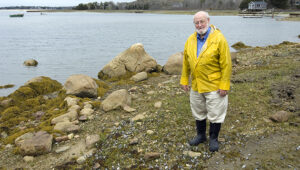BIOS Trustee Honored with American Geophysical Union Award

Photo by Tom Kleindinst, © Woods Hole Oceanographic Institution
BIOS trustee John Farrington was named a fellow of the American Geophysical Union (AGU) this summer, a tribute to member scientists who have made “exceptional contributions to Earth and space sciences.”
Farrington, 70, has been a BIOS trustee since April 1992. He first visited BIOS (then the Bermuda Biological Station) in 1969 while in Bermuda as a graduate student boarding a research cruise in St. Georges. Prior to becoming a trustee he made numerous subsequent visits for cooperative research, scientific meetings, and workshops.
Farrington began his chemical oceanography career in the early 1970s at the University of Rhode Island, where his dissertation produced the first of a classic series of papers on the organic geochemistry of marine sediments. Though early research techniques were crude by modern standards, Farrington saw the now famous presence of an “unresolved complex mixture” within the hydrocarbon complex in sediments, and sought ways to shed light on this critical suite of compounds.
“This hidden signal fascinated John, and he has pursued a marvelous career in marine organic geochemistry designed to unravel both natural processes and the comingled imprint of man from petroleum hydrocarbons and other pollutants,” said Peter Brewer, an ocean chemist at the Monterey Bay Aquarium Research Institute who helped with the nomination of Farrington for the AGU award. “The gap between the ‘natural’ and ‘contaminated’ worlds of ocean science was huge, both culturally and technically. And John has been the giant that straddled these fields and earned respect from all sides.”
Farrington is renowned in the area of petroleum geochemistry in the marine environment, Brewer said, “and the world is better for it. He was convinced early on that significant ecological damage to coastal ocean ecosystems could result from pervasive petroleum leakage. John has pursued this matter with dogged determination and critical insight.”
Farrington spent his career primarily at the Woods Hole Oceanographic Institution (WHOI) in a succession of positions from postdoctoral investigator to senior scientist. He served in numerous leadership roles at WHOI, including at the Institution’s coastal research center and within the education, academic programs, and graduate studies departments. From 2002 until 2005 he served as vice president for academic programs and dean. He was named scientist emeritus following his 2006 retirement from WHOI.
He has published 121 scientific papers and chapters in the scientific literature and more than 30 papers about science-policy interactions and education in marine sciences. Farrington served as president of the ocean sciences section of AGU for two years until 2010, one of 11 sections that provide the main structure for managing volunteers, developing leaders, and honoring scientists.
Farrington said he is “honored to have professional accomplishments worthy of being elected an AGU fellow.”
“I recognize that my accomplishments are because of the privilege, honor, and enjoyment of interactions in research with numerous co-workers, colleagues, postdocs and students with whom I have collaborated over the forty-plus years of my career to date,” he said.
The AGU, established in 1919, is a nonprofit organization of geoscientists consisting of over 62,000 members from 144 countries. Farrington and other awardees will be recognized at the AGU’s annual fall meeting in San Francisco.
The full AGU award announcement can be found at: https://eos.org/agu-news/2015-class-of-agu-fellows-announced
